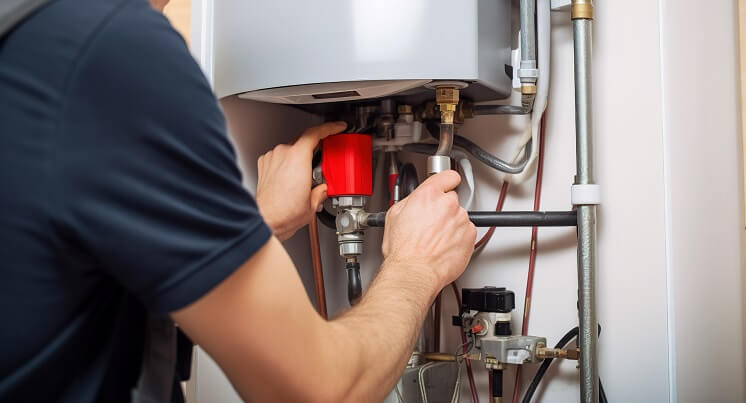Fixing Standard Heater Problems
Fixing Standard Heater Problems
Blog Article
We've stumbled upon this post involving Water Heater Repair and Troubleshooting directly below on the web and believe it made perfect sense to write about it with you on this page.

Visualize beginning your day without your regular warm shower. That already sets an inadequate tone for the remainder of your day.
Every home requires a reputable water heater, yet just a few understand just how to manage one. One very easy means to maintain your hot water heater in leading shape is to look for mistakes frequently and fix them as quickly as they appear.
Keep in mind to switch off your water heater before smelling around for faults. These are the water heater faults you are more than likely to encounter.
Water as well hot or too chilly
Every water heater has a thermostat that identifies how warm the water gets. If the water entering your home is too warm in spite of establishing a hassle-free optimum temperature, your thermostat could be malfunctioning.
On the other hand, too cold water may be because of a stopped working thermostat, a broken circuit, or incorrect gas circulation. For instance, if you use a gas hot water heater with a busted pilot light, you would get cold water, even if the thermostat is in ideal problem. For electrical heaters, a blown fuse may be the culprit.
Inadequate warm water
Water heaters can be found in many sizes, depending upon your warm water needs. If you lack warm water before everybody has had a bath, your hot water heater is too little for your family size. You should consider mounting a larger hot water heater container or choosing a tankless water heater, which takes up less space and also is more durable.
Unusual sounds
There go to least 5 type of noises you can learn through a water heater, but one of the most common analysis is that it's time for the hot water heater to retire.
Firstly, you must be familiar with the regular seems a hot water heater makes. An electric heating unit may sound different from a gas-powered one.
Popping or banging sounds generally indicate there is a piece of debris in your containers, and it's time to clean it out. On the other hand, whistling or hissing noises might just be your valves letting some pressure off.
Water leaks
Leaks might come from pipelines, water links, shutoffs, or in the worst-case situation, the storage tank itself. Over time, water will wear away the tank, and find its way out. If this happens, you require to change your hot water heater immediately.
Nevertheless, prior to your change your entire tank, make certain that all pipelines remain in location which each shutoff works completely. If you still need assistance recognizing a leakage, call your plumber.
Rust-colored water
Rust-colored water means one of your water heater elements is corroded. It could be the anode rod, or the tank itself. Your plumber will be able to determine which it is.
Warm water
Regardless of just how high you set the thermostat, you will not obtain any type of warm water out of a heating unit well past its prime. A water heater's effectiveness may reduce with time.
You will certainly likewise get lukewarm water if your pipelines have a cross connection. This means that when you activate a faucet, warm water from the heater flows in along with normal, cold water. A cross link is easy to spot. If your warm water taps still run after shutting the hot water heater valves, you have a cross connection.
Discoloured Water
Rust is a significant root cause of dirty or discoloured water. Corrosion within the water container or a stopping working anode pole might cause this discolouration. The anode pole shields the storage tank from rusting on the inside and also ought to be checked yearly. Without a rod or a correctly functioning anode pole, the hot water quickly rusts inside the container. Call an expert hot water heater specialist to establish if changing the anode pole will deal with the trouble; if not, replace your water heater.
Verdict
Preferably, your hot water heater can last 10 years prior to you need a change. Nonetheless, after the 10-year mark, you may experience any one of these faults much more routinely. At this point, you need to include a brand-new hot water heater to your budget.
How To Troubleshoot 3 Common Water Heater Problems in Twin Cities
The Water Heater Is Leaking
A leaky cold water inlet valve A loose pipe fitting A leaky temperature and pressure relief valve A corroded anode rod A cracked tank Turn Off Your Water Heater:
Shut off your gas water heater by turning the gas valve on the unit to the “OFF” position. Shut off your electric water by switching its power off at your electrical panel. Look for a two-pole breaker labeled “water heater” and turn it to the “OFF” position. Move the ball valve connected to the water heater to be perpendicular to the piping at a 90° angle. Look for the Leak:
Depending on whether the water is coming from the tank's top or bottom, you’ll want to look for the leak in different locations.
If the leak comes from the top of the tank, carefully look for water escaping from the cold water inlet valve or loose pipe fittings. Rusted hot and cold water valves can have loose connections with the tank, with water leaking out of them.
https://mspplumbingheatingair.com/blog/how-to-troubleshoot-3-common-water-heater-problems
I stumbled upon that article about Common Problems with Your Home Water Heater when scouting around the search engines. Be sure to take the opportunity to distribute this blog post if you enjoyed reading it. I am grateful for your time. Come back soon.
Book A Free Estimate Report this page